#i just really want a season of every day comedy & low stakes drama moments
Note
jason and co being like if there's gonna be a s4 they're gonna need to wait for the inspiration to strike of where to take the story if there even is any further story. meanwhile james is out here with his 70k fic lined up ready to go
JASON SEASON 4 IS TED ACCEPTING LOVE OKAY. HE HASN'T DONE THAT YET HE NEEDS THAT ARC. season 4 ted learns it can be about him. and all these people that love himmmm
SAY IT!!!!!!!! ted needs to break down his walls and allow himself to be taken care of!!!
also....the way i would watch s4 even if the football focus was gone....astronomical. if it was just a season full of no real plot outside of ted in richmond learning to accept love in all its forms, count me in. give me that same type of storytelling derry girls used, where it focuses in on every day life with no big overarching stakes.
it'd never be boring because the past three seasons have laid the foundation for character-driven shenanigans from a stacked cast of individualized characters.
you can't tell me phoebe and henry wouldn't cause mayhem together the second roy and ted introduce them to each other. or that trent and ted in a museum together would be anything but an impassioned game of Who Can One Up The Other In Weird Niche References & Jokes. or that the week before a fundraiser event, rebecca would paint ted's nails over a wine night to see which color would best match her dress, all the while ted opens up to her about whatever is on his mind.
a season of domestic, steady life in richmond where ted isn't under this insane "what am i doing here" pressure would be amazing, i think. we'd finally see what ted is like when he's settled in and relaxed without the strain of living away from henry. what would his home decor choices be? does he teach henry how to bake biscuits? how does he show up for his found family outside of the role of Coach?
i think it would be interesting to see how the other characters operate outside of the Football Club backdrop, too. do will and leslie go to more jazz clubs together? what does dani do on his days off? have moe and beard ever accidentally run into each other on a night out?
there's so much potential there to keep building up the richmond lore & world & relationships
37 notes
·
View notes
Text
Little Revolución Re-listen
Hey again! It's episode two of my epic Wolf 359 re-listen, which means:
Little Revolución
In which Eiffel hoards toothpaste, Hilbert and Minkowski get gas-happy and Command are, reading between the lines, the Actual Worst.
We open up with Mussorgsky's Night on the Bare Mountain, which I will always mentally link to my primary school, because for some reason they played it before morning assemblies a lot? (Which, in hindsight, was kind of weird.) Personal connections aside, though, it's just the right music to set the tone for this episode: big, bombastic and stupidly overdramatic.
What follows is a comedy-heavy episode, with slightly more fleshed-out versions of the non-Eiffel characters, which is nice to hear. Hera is sarcastic, Hilbert is suitably menacing, and Minkowski also sounds more like herself - and they all do things that actually advance the plot this time round! Yay!
That said, the star of the show, is still, without a doubt, Eiffel, who somehow manages to be even more ridiculous than last episode? This time round, we start in media res, after Eiffel has stolen the last remaining tube of toothpaste and is holding it hostage.
And okay. That in itself is a really funny idea. Of all the things to mutiny over, I love that it's something as mundane and low-key as toothpaste. It's just enough of a creature comfort to give the conflict stakes, but also... it's toothpaste, man. And it's one single tube of toothpaste!
But I think most of comedy in this episode comes specifically from the fact that it's Eiffel holding the toothpaste hostage. Which means we basically get to spend the whole episode watching him dig himself deeper. There's a sense of futility to his mutiny from pretty much the moment he mutes Minkowski at the beginning, and from that point on, the it’s just a question of "how ridiculous will this get, before Eiffel breaks?"
The answer? Pretty darn ridiculous, and it is 100% Eiffel's own fault. I mean, at every step in this episode he just escalates things. From bringing up hostages in the first place to his whole announcement, complete with dramatic music that I assume (?) he must have added to the message himself just to make it sound cooler, to barricading himself in the comms room, literally everything he does here is totally nuts.
It's enough to trigger Eiffel Protocol M - and I really, really want to know what all the other protocols are, and why they were invented - which means that when the log comes back, we have a shivering, miserable Eiffel, slowly being driven mad by random loud noises. Which, again, I love. Putting characters in some sort of extreme physical discomfort feels like one of Wolf 359's go-to beats, both for comedy (case in point, this episode) and for drama (hello, Pan-Pan, and Mayday, come to think of it), and it's fun to see it used for the very first time here.
It's also at this point that we get an insight into what Minkowski and Hilbert are planning, and honestly, I really wish this episode featured more of them working together, because the glimpse we get is so good! Hilbert just straight up gassing Eiffel! Minkowski asking if there could, possibly, be some pain! "Minimal risk of brain damage"!
The show, at this point, is still pretty firmly committed to the log format, though, and will be until... actually, I'm not sure when we stop just getting Eiffel's recordings. Is it as late as Season 2?
Either way, it means we do miss out on Minkowski and Hilbert having to work together, which is kind of a pity, although the episode works find without it. And in a way, it's almost funnier, because we're just as confused as Eiffel is, especially when the gas doesn't knock him out and gives him weird hallucinations instead. I mean, what is up with that? Did it just not work? Is is some weird psychological warfare tactic on the part of Hilbert and Minkowski?
In any case, it pushes Eiffel right to his breaking point, just in time for Hera to distract him while Hilbert dissolves the door hinges. Eiffel folds pretty rapidly after that, and ends the episode in the supply cl- sorry, in the brig. He honestly seems pretty resigned to his fate, as well. So at least he knows when he's beat.
And to be honest, I actually feel sorry for Eiffel here. The whole episode, after all, shows how space can slowly chip away at your sanity, messing with you in small, irritating ways until, inevitably, you snap - even before Minkowski and Hilbert go to work on you. Eiffel's overreaction to running out of toothpaste is funny, sure. But behind it lie months and months where, little by little, he's been deprived of all his creature comforts. It's small stuff, but I can totally see why it would, cumulatively, start to drive you nuts, until any little thing - even toothpaste - might just push you over the edge.
Even worse, Command had to have called this. There is no way they "accidentally" failed to pack enough toothpaste - because it's not like the Hephaestus is anywhere near the end of its mission. So Command must have known that this would happen, and either they didn't care, or they actively wanted it to happen, as part of some kind of twisted, gaslight-y psychological experiment, not unlike the Empty Man, later on in the season.
Either way, it means that by the end of the episode, we're left with a sense of the negative psychological effects of daily life in space, and, potentially, our first hint at how awful Command is. Not bad, for an episode that is, still, a comedy episode about Eiffel hoarding toothpaste.
Because it is still, at the end of the day, a comedy. Sure, there's some dark bits if you read between the lines. But it's also just straightforwardly lightweight and funny, and after listening to the end of the series, do you know what? That's actually kind of refreshing. We don’t get many straight-up comedy episodes after season one, so revisiting this one was pretty great!
Miscellaneous thoughts:
"Nothing is premeditated here! The very suggestion that I would meditate anything... I mean, it’s laughable." Hah!
Well their new brig is going to come in v e r y handy, v e r y soon
Aww, Eiffel asking if anything is wrong with the star. Just you wait, Doug...
Also I 100% fell for Hera’s misdirect the first time I listened to this and I don’t know it that’s because Hera’s good or because I’m gullible
“When in doubt, whip it out. "It” being hydrochloric acid.”
#wolf 359#wolf359#w359#wolf 359 relisten#little revolución#nellied reviews#shorter this time#because comedy episode#but hey#also#I want to listen to Night on the Bare Mountain now#just blast it really loud
27 notes
·
View notes
Text
ace of diamond (season 1) review

Hey there! I have recently finished the first season of Ace of Diamond and I’m going to be reviewing on five categories: plot/pacing, characterization/relationships, voice acting, art and OST. Aaaand because of how much I enjoyed it, I’m going to throw in my favorite character, dynamic and OP/ED. At the end I’ll be adding rewatchability/recc score.
Genre: Shonen / Sports
Subgenres: Comedy / Slice of Life / School
Synopsis: Sawamura Eijun is a unique southpaw pitcher from a small town in Nagano with a lot of potential but unpolished skills. After being scouted to play for Seidou High School (a prestigous baseball school in Tokyo) he is encouraged by his friends and family to go and accept the offer and pursue his passion for baseball at a higher level. Confident to the point of arrogant, he declares that he will be the ace pitcher on this new team and be the best -- but has to grapple with the fact he is surrounded now by extremely powerful, talented players who have been honing their skills for years-- some of whom are better than him, like his rival Furuya Satoru, a pitcher with a wicked fastball. Together, this team aims to be the best in Japan and aim for the Summer Koshien, tackling formidable teams who stand in their way--as well as work on their own goals, dreams, fears and insecurities.
Plot & pacing: The pacing of this show is very well done. In a 75 episode first season, it is rather long, with many of the baseball games drawn out. But its well worth it, as the writing brings a lot of emotional gratification by “feeling what they feel.” Starting with Sawamura being scouted, going through intense spring training and the selection of the summer starting roster, throughout the highs and lows of the summer season and into the post-summer scrimmages and finally rounding out the season with the third-year retirement game before the fall tournament raffle, every bit is given important narrative attention.
The reveal of information through the eyes of the protagonist; not knowing about Chris Yuu Takagawa’s injury until Sawamura knows it, not knowing how much the current third years sucked as players until the right moment through flashbacks during the tipping point of the finals game, for example -- is such an important choice that we as an audience feel what he feels. The summer games feel very high stakes, the emotional impact is well-earned; every victory feels like it was earned and not given through plot armor or well ~obviously Seidou is the protagonist team, they have to win.~ Seidou as a team was written as strong but not invincible. SPOILER: This is emphasized at the finals game against Inashiro. Despite losing, while emotionally devastating, it feels like it was a logical writing choice and will be important growth for not just Sawamura but the team as a whole.
The yips arc that follows the loss wraps up in a very wholesome retirement game, with Sawamura not fully recovering, but beginning to do truly do so, and the hopeful note of beginning the fall tournament, leaving the audience ready and excited for more.
As a side note, Ace of Diamond very beautifully balances comedy to drama, so it takes itself seriously but is also genuinely comedic. I have two running jokes of “fellas, is it gay to x” and “screenshot of out context being x” as well as actually laughing over some of the planned jokes. But it is truly an emotional carthartic journey.
[Did I cry? yes. so much.]
characterization & relationships: All of the characters feel very well-rounded with diverse ethnic and social backgrounds and personality traits. Some may be static but many of them experience growth to become better people and players. Sawamura is a good “bouncing board” of a character, as someone who goes from arrogant to experiencing several setbacks and a devastating loss that makes him examine his own biases, weaknesses and flaws that also reveals to his opponents their own shortcomings. Several other characters are better players than him, and that’s okay. On the flipside, one of the canon examinations as well as audience reaction is that Coach Kataoka has a team who is a family, a well-oiled machine who works amazingly together because they trust and care for one another, that he encourages growth and inspires them to be the best not just as baseball players, but as individuals as well. The opposing teams are also not just blank slates to fight against, but thoughtful people with their own desires, backgrounds and flaws--Mei Narumiya is cocky and unable to handle criticism once put on a pedestal, Sanada Shunpei has low stamina, etc etc.
Something that’s extremely important to reemphasize is the relationship the Seidou team has to one another in that everyone affects everyone else. Sawamura chooses to go to Seidou specifically because Miyuki Kazuya, a first year at the time, encouraged him to pitch, so he had one upperclassman who already believed in him by the time he enrolled. Sawamura has both batchmates (first years Furuya Satoru and Haruichi Kominato) that encourage him through rivalry (Furuya) or gentle friendship (Haruichi) and several upperclassmen he admires and multiple times states he adores this team as it is, because he looks up to them for guidance and inspiration-- quiet team captain Tetsuya Yuuki, loud outfielder Isashiki Jun (the namesake of this blog, “the spitz of seidou”), speed demons Ryousuke Kominato and Youichi Kuramochi, and more.
In particular, he has an exchange of growth with Chris Yuu Takagawa, someone he mistook for being uncaring and hopeless about baseball with a dead-eyed appearance. Chris, after being injured, all but had given up on playing again, but Sawamura’s noisy and blunt personality who kept pushing him encouraged him to return to the field, and have hope again. Chris is a teacher that Sawamura then deeply respects and is there for him when he has the yips, returning the favor to help break him out his funk. The symbolism. *weeps*
Important to note also it that is isn’t just about Sawamura and the effect he has on them, but the relationships they have with each other. The Kominato brothers have their own relationship where Haruichi wants to be like his older brother; Isashiki may act wild and aggressive and cocky, but he is truly humbled by their team captain Tetsu; Miyuki and Chris met years before Seidou and that informs their dynamic and the kind of players they are today. This also extends to other teams; some have similarities like Akikawa Academy revering their pitcher Yang Shunchen and how that parallels with Seidou adoring Tanba even when he was out with an injury, and others juxtaposed with them i.e. how some players at Inashiro seem to resent the spotlight Mei receives or Shirakawa callously telling another player to kill himself.
I also wanted to note the way Coach Kataoka also sees his team; he is in many ways like a stern but loving father figure who wants the best out of his boys in every way, off and on the field. Other coaches seem to care more about money or fame than their wellbeing (Coach Todoroki or the replacement coach for Seidou), and others have different styles as coaches whether from pro experience or just age. It really emphasizes that it’s not just about the talent a team may or may not have, but how those players are nurtured as people.
(Favorite relationships: Chris & Sawamura, the Kominatos, Miyuki & Chris, .)
[Side note: if you care about shipping, this is a buffet, you’re going to have a great time.]
Voice Acting: The voices of this cast are spot on. Everyone’s voice seems to match their face and personalities and all of the voice actors give 110% to the character. The voices really make it for me, as I’m very particular about the sounds. It feels very realistic and the voices really make them seem like actual people and gives the audience a reason to invest. I’ve got nothing but praise for the voice actors and voice direction of this cast.
Art: I could go on and on about the art. The motion is very fluid, the backgrounds are amazing. The character designs are stunning and everyone feels unique and given thought. Style-wise it was very refreshing to see as a lot of modern anime I’ve been watching seems to have the stereotypical “2000s” feel, whereas Ace of Diamond feels like a gorgeous late nineties/early 2000s homage--fitting since, despite airing in 2013-2015, the manga originated in 2006 and it followed the art of the manga nicely. The color palettes are very beautiful and vibrant. I remarked more than once while watching it that it was clear that the artists cared for studying human anatomy, movement and realism (in comparison to how some battle shonen care more for looking cool.) The art is what drew me in to begin with and it never disappointed.
OST: I loved the OST so much. Frying-Pan did such an amazing job delivering gorgeous pieces of music. The beauty of it was just off the charts and went above and beyond to make fitting pieces for character themes, scenario specific pieces etc. Also the OPs by Tom H@ck and Glay were appropriately themed and got me pumped every time. I love the various endings also and their little character revealing bits. I like them all so much I never skipped them while watching.
[Favorite OP: Perfect Hero. Favorite ED: Cloud Nine. I listen to Cloud Nine literally every day.]
Can I rewatch? Absolutely! Even knowing what’s going to happen, the emotional journey is worth it.
Would I recommend? 10/10. Even if you don’t like sports, this is a great one. It was my first sports anime and it has set the bar so very high.
6 notes
·
View notes
Text
I was really hoping to update NTW this weekend, but it’s looking less and less likely... so, here’s something else.
I found an alternate season 6/7 thing I started outlining when that whole mess went down, like just ideas for how Ian’s storyline could have worked out after season 5 (I would have included the other characters too, but honestly I don’t know what they’ve been up to since I stopped watching. Fiona bought a building. For some reason. I don’t want to know.).
So I’ve added some stuff for season 8 and 9, and since I’m probably never going to write it I thought I’d just share it for laughs.
May the 4th be with you!
Alt Shameless after season 5
Ian is on his meds and since he broke up with Mickey because he thought he’d be better off alone, he doesn’t go looking for new boyfriends.
He sleeps around a lot though.
He doesn’t have a lot of storyline, because he’s mostly clammed up and moping around, and his family keep assuming that it’s because of his meds.
Maybe four episodes in, something happens at work that makes Ian seek out an LGBT+ group, where he meets Trevor at a charity event. They work together all day and really hit it off, they have some similar interests (interests!), and they end up talking about a lot of things (things!). At the end of the day, Trevor asks him out, and Ian says yes before he’s remembered that he doesn’t do that stuff.
He’s nervous about the date and drinks a couple of beers before Trevor even shows up, he gets piss drunk and wakes up the next day in a strange room.
It’s Trevor’s bedroom, and Trevor comes in with coffee, telling him that Ian was pretty much drunk when he showed up and barely able to stand on his own two legs by the time they left. He doesn’t know where he lives, so he took him home for the night.
Ian tells him about being on meds, and that’s why he got so drunk so fast.
Trevor thinks he could have just told him, and Ian says his mental illness pretty much was the reason his old relationship didn’t work out.
Trevor asks if it was Mickey. Ian wonders what Trevor knows about it.
“You may have mentioned him last night.”
Ian says yeah, and is quick to correct him when Trevor assumes that it was Mickey who left.
“I broke up with him, thought it was the best for the both of us at the time… also don’t think I expected it to last. We usually find our way back.”
“But not this time?”
“He’s in prison. Fifteen years.”
It’s the first time he says it out loud.
Trevor says he’s not interested in starting a relationship with someone who’s clearly still in love with their ex (and Ian kinda smiles, because it’s true and it’s so nice that someone else can see it and accept it and take it seriously). But, he says, you do look like you could use a friend, and not to brag, but I make an excellent friend. He does the cheesy handshake, re-introduction thing (where we find out his last name!) and they agree to be friends.
(Turns out Trevor is estranged from his family, and after maybe a shaky start, he finds a natural spot in the Gallagher clan and becomes part of some of the other plot points throughout the season.)
Ian’s storylines can be about his work, and about stuff happening at the LGBT+ youth center, and they get into hijinks, but nothing super serious (or illegal!!).
Ian at some point has a big moment with Yevgeny, where he comes to terms with no longer being a parent, and maybe even thinking that it’s for the best. (Svetlana and her thrupple storyline can basically be the same, but end differently. With the three of them happy and together, and Yevgeny thinking of Kev as his dad. It’s not ideal, but neither is Yev being sad about his dad being in prison.) Maybe Ian talks to Svetlana about Mickey, maybe finding out for the first time that they aren’t married anymore. We don’t find out what Ian thinks or feels about this.
Throughout the second half of the season. Whenever the Gallaghers gather and Ian isn’t there, they wonder where he is and try to reach him, letting it go when he doesn’t answer.
But after it happens too many times to be a coincidence, they start wondering. Maybe Lip and Fiona talk about it, worrying about Ian having a low, or a high, but not knowing if they should intervene.
Lip talks to Trevor, and tells him more about Ian’s bipolar. Trevor denies having noticed anything going on, and maybe even questions if Lip has any right telling him Ian’s personal stuff.
(Also, I think it would be really nice for Trevor to have a romantic/sexy storyline... so I wouldn’t mind Trevor and Ian starting a friends with benefits relationship, deciding on the terms of it before they start it. Or, Trevor starts a relationship with someone else. Depends on how much drama one wants. Trevor could develop unrequited feelings. If one wants. But personally I think it would be more fun for everyone involved if he was allowed to fall in love with someone else.)
Last episode of the season, they’ve had some big plot point resolved by the Gallaghers getting together and working it out as a goddamned team, and they’re all sitting on the porch steps when a police car stops outside their house.
The officer tells them that Ian is on record as having visited Mickey in prison, and Lip is like, yeah, maybe a couple of times a year ago, what’s that got to do with anything? And the officer says, no, he’s visited once a week for the past six months. And Mickey has escaped. And they have a warrant to search their house.
The Gallaghers sit packed together on the couch watching the news as the officers search through the house, and on the TV we get the whole scoop. There has been a massive prison break and like 40 highly dangerous inmates have escaped, Mickey amongst them.
BOOM. Credits.
Season seven.
Throughout the season, we get like comedic side story lines about the police and the escaped inmates basically roaming the streets. Potentially outrageous and lots of opportunity to oscillate between slapstick comedy and high-stakes drama.
Ian waits for Mickey to contact him, but it doesn’t happen until maybe a couple of episodes in. TENSION.
Ian has other storylines through the season, but mainly it ends up being his secret rendezvous (plural, frequent, in-depth, sexy) with Mickey where they get to spend time together, talk. Bonus if they try to “be friends” for a while, because they don’t talk about the important stuff and they don’t know where they have each other, and they don’t know what’s going to happen. It doesn’t last long, culminating in an explosively passionate love scene.
At some point, Ian is approached by an FBI agent, telling him they have a deal for Mickey if he turns himself in and gives them info on the other escapees. Ian says he’s not in contact with Mickey and even if he was, Mickey would never snitch.
Later on, he talks to Mickey about their future. Mickey explains that the gang he joined in prison are escaping across the border to Mexico, and he has to go with them. Ian says he’ll come with Mickey, but Mickey is firmly against it.
He wants Ian to come with him, of course, but he doesn’t want that life for Ian. No security, a life of crime, on the lam. He kind of gets why Ian broke up with him, now, if this is anything like what he felt at the time, stuck between a rock and a hard place. Ian pleads with him, telling him that breaking up is something he’s only ever regretted since he did it.
Yeah, but what other choice have we got?
Ian tells him about the deal, and takes out two gold bands he’s bought from a pawnshop. If they get married, they can be put in the witness protection program together, and start over.
Mickey agrees, to Ian’s great surprise, and they end the season being shipped off to an unknown location as the busload of prisoners get apprehended on the way to Mexico (cartoonish, but with a little bit of work and research, maybe could be an acceptably goofy and almost realistic plot point).
(For Drama, Mickey could be with the prisoners when they’re apprehended, and he’s shot dead by the police. Cut to Ian being in the ambulance that picks him up, and Mickey is still sitting in his body bag, all bloodied, as they suck face and the FBI drive them to their new location.)
Season 8
Ian and Mickey try to start a new life and it turns completely ridiculous (like, imagine a mix between IASIP where Mac and Dennis are in the house with the Mac & Cheese mixed with like, Suburgatory, or Weeds, or whatever. Two gay South Side kids suddenly trying to make a life for themselves in some middle class suburb somewhere, and they hate it and it all goes to shit. But they love each other and get each other through it.)
The hardship they face in their new life doesn’t come from them, (it’s from situations and circumstance, and other people being impossible) and every time something happens it only leads them to break down another barrier by eventually talking about their feelings and hopes for the future, and thoughts about the past. And I want them specifically to talk about Yevgeny, how hard it was for Mickey to feel anything good about him at first, but now he misses him like he’s missing a limb. Them trying to be a wholesome couple in a suburb somewhere is an unmitigated disaster, but it does help them get a lot closer to each other and work through their problems, and their past.
And then through some Shameless™ retcon, something suddenly makes it possible for them to return back home. Or maybe they’re just like, fuck this, is there anyone stopping us from just grabbing our shit and going home?? No. So they do.
Yevgeny is part of the reason why they return. They move in to the apartment above the Alibi at first, and Mickey can work with Svetlana in the bar and cook up semi-illegal side-hustles with Kev.
Everybody they know are on their side, denying everything in true South Side style if anyone asks about them, once again solidifying the core concept of the show; we take care of family.
The whole thing where they’re possibly in danger from the Mexican cartel looking to exact revenge for Mickey snitching (if they ever find out that he’s alive) could be played for laughs and brushed off, until it might come back and create more Drama in a later season, if needed, before being permanently resolved.
Characters thinking they’re invincible and being stupid about stuff like this is fine, I think, if they do it for a good reason.
24 notes
·
View notes
Text
Once a Single Mom with a Dream, Taraji P. Henson is Now a Hollywood Headliner
Want to know what it feels like for a woman to be a commanding presence in a man’s world? Just ask Taraji P. Henson, who might be the greatest motivational speaker we ladies have at the moment.
“I feel like a boss bitch,” she says, flashing her megawatt grin. “I’m grabbing my nuts, like, ‘Yeah!’ ”
Could we consider this an apt metaphor for the current push-pull of power dynamics? Perhaps. As Henson knows, there’s no time to mince words anymore. From the #MeToo movement to the midterm elections, we’ve seen what happens when women stake their claim. Henson, a single mother from Washington, D.C., who has worked in the industry for over 20 years, is among those finally getting their due — and she’s not afraid to say it.
Her latest film, What Men Want, explicitly explores these themes. Out in February, it flips the script from the Nancy Meyers-directed What Women Want (2000), which starred Mel Gibson and Helen Hunt. Henson plays Ali Davis, a cocky (for lack of a better term) sports agent. After getting passed over for a big promotion, she visits a psychic (the singer Erykah Badu) who provides her with a special tea that allows her to hear men’s thoughts.
Henson stars and also serves as an executive producer. It’s the first time the 48-year-old actress — who has nailed every dramatic role that has come her way — is getting a chance to flex her musical-theater-trained muscles as the lead in a full-fledged comedy. And Henson is clearly in her element, engaging in the kind of “I’ll do anything for laughs” physical antics emblematic of her heroes Carol Burnett and Lucille Ball.
“I’ve always been the funny girl,” Henson says emphatically. “Not that I was pigeonholed. They were all great dramatic roles, but I’ve been dying. I just felt so honored and grateful to get a comedy where I could let it all hang out. My best friend was like, ‘Lord, they don’t know what they have unleashed.’ ”
“Taraji is old-school funny,” says someone who would know, her What Men Want co-star Tracy Morgan. “She is willing to take a pie to the face or stuff a bunch of candy in her mouth to get a laugh. She cuts the monster but doesn’t cut too deep because she knows we need the monster comedy.”
This past November Henson also voiced the animated character Yesss (which Henson pronounces as “Yesssssss” in her sweet drawl) in Ralph Breaks the Internet, Disney’s big-budget sequel to Wreck-It Ralph, which grossed over $400 million worldwide. It was another chance for her to show off her comedic chops, but this time for the kids. And after years of struggling to make it in Hollywood, she’s acutely aware of how doing a family film can help her bank account.
“You know, that’s [audiences buying] four tickets instead of two,” Henson says. “That’s generally going to be the largest-grossing film in anyone’s repertoire.”
To attend InStyle’s shoot, she took a 24-hour break from the Chicago set of Empire and her most significant character to date, the cutting and campy Cookie Lyon. Henson admits that the silver-tongued ex-con and matriarch of the Lyon family was the one who really put her on the Hollywood map. Despite all her successes — in the Oscar-nominated films Hidden Figures and The Curious Case of Benjamin Button — Henson has never had a movie studio bring her overseas to do press. But Cookie has.
“Hollywood executives would tell me that I don’t have fans all the way over there,” Henson says, shaking her head. “I said, ‘You’re lying because they can reach me any time. I’m a finger tap away, and they let me know every day.’ ” And while the international box office plays a big role in getting lead parts in feature films, it was Cookie who let Henson know she was appreciated. “Then we go to Paris [to promote Empire], and it’s standing room only in a room with 1,500 seats. I cried. If you believe what people tell you … you can’t let people tell you shit.”
Henson’s strong sense of self comes from her parents. She was an only child until she was 17 (her half sister, April, now works as her “a-sister-ant”). Her father, Boris, was a Vietnam War vet who battled PTSD and alcoholism throughout her childhood. Despite his mood swings, Henson says, he instilled in her a no-fear attitude that has stuck with her to this day. From her mother, Bernice, she inherited her endless drive and passion.
“I was like the Punky Brewster of the hood,” Henson says with a laugh. “I was a well-rounded kid, but I could also scrap if necessary. But I wasn’t that hard. I still had Strawberry Shortcake wallpaper in my room, and my friend Tracie and I were doing Shakespeare in the Park … and we were in the f—ing hood.”
Though it was clear from an early age that Henson was a natural-born performer, she spent her nascent college years attempting to follow in her father’s footsteps by studying engineering at North Carolina A&T State University. With her colorful outfits and spirited attitude, she earned the on-campus nickname Hollywood, yet it still took failing math classes for her to realize the sciences were not where she belonged. When she called Boris to tell him, he was not surprised.
“Good,” he said. “Get your ass back up to D.C. and enroll in Howard’s drama department. Do what you’re supposed to be doing.”
While attending Howard University, Henson became pregnant with her son, Marcell. After graduation the single mom and her baby boy moved to Los Angeles with $700 borrowed from family and friends so she could pursue her dreams. Between casting calls, there were stints as a substitute teacher for kids with special needs. Eventually she landed an agent, and guest spots on network television shows soon followed. But it was her roles in films such as Baby Boy and Hustle & Flow that really made Hollywood take notice.
Now that she’s got the mic, Henson is putting it to good use, choosing impactful projects like this spring’s The Best of Enemies, about civil-rights activist Ann Atwater and her unlikely friendship with C.P. Ellis (portrayed by Sam Rockwell), a former member of the Ku Klux Klan. She is also starring in and producing a movie about Emmett Till, the teenager who was lynched for allegedly whistling at a white woman in Mississippi in 1955.
“I don’t care if you’re young or old or what color you are, art is so powerful,” she says on the topic of representation. “You can show things to people you’ve never met and you broaden horizons. I don’t take for granted what I have, and I try to use it in any way I can, positively.”
The fact that Hollywood continues to preach about the importance of diversity but then casts predominately white males in lead roles is not lost on the actress. “Here’s the deal: When you talk about money, don’t you want to make money? I want every walk of life [in my films]. If I could put an alien in, I would. I want their money too. Come on, it’s what the world looks like. That’s what people want to see, representation. That’s all. You can make money doing it. It’s a no-brainer.”
She also recently established the Boris Lawrence Henson Foundation (named after her beloved father), which encourages African-Americans with mental-health issues to seek the help they need. “It was born out of necessity,” she says. “You know, traumatic stuff happened to me and my son. [Her ex-boyfriend, Marcell’s father, was murdered in 2003.] You can’t just pray it away. I don’t care how strong you are. It gets to you, and if you don’t deal with it, it manifests itself in ways you don’t even know.
“My white friends have standing appointments with their therapists,” Henson continues. “I was like, ‘Why aren’t we doing that?’ In our culture, it’s taboo.” The first people to sign on? Her male friends from the industry, all of whom wrote checks on the spot. “The black men stepped up. Snoop Dogg, Xzibit, Tracy Morgan, Chance the Rapper all stepped up. I called, they answered. Snoop told me, ‘Baby girl, that’s important. What you’re doing is important.’ Tyrese said, ‘You’re making it cool to seek help.’ ”
Another supportive figure is her fiancé, former NFL cornerback (and Super Bowl XLI winner) Kelvin Hayden. The two were quietly dating for three years before Hayden proposed last Mother’s Day. They are planning to wed this summer in a private, low-key affair, and though her designer friends are offering to make her a dress, Henson is opting for the most efficient route.
“I’m not going to go through 10,000 dresses,” she says. “How does it fit? How do I feel? Does it complement me well? Let’s just go with this one. I know what looks good on me. I’m not going to spend 10 hours on a fitting. I hate that.”
The wedding itself will probably take place in July, once Henson figures out if Empire is going to be picked up for a sixth season. Fortunately, it is filmed in Chicago, where she and Hayden reside with Marcell — now 24 and an aspiring rapper and music producer — and their miniature French bulldog, K-Ball, which was Hayden’s nickname when he played in the NFL.
Their life is a healthy one. Hayden runs his own gym, and she’s always cooking new vegan treats for her tribe. She made the jump to veganism after suffering massive stomach pains while filming The Best of Enemies this past summer. “It took a doctor in Macon, Ga., to say, ‘If you don’t change what you’re doing, you’re going to get stomach cancer.’ I said, ‘Say no more.’ So I switched everything up out of necessity. I want to live. Thank God, because I feel so much better.”
Now that she’s in love, at the top of her game, and clearly adored by the world at large, Henson is ready to expand her repertoire even further. “The older I get, I want to work smarter, not harder,” she says. She’ll answer that superhero hotline if it rings — “DC, Marvel, you all can call me!” — but for now she’s content being the funny girl.
“I want to show you this,” she says, grabbing her phone to play a video that was sent to her by What Men Want director Adam Shankman. It’s footage from an early screening, and the audience is roaring with laughter.
Henson admits to having goose bumps as she cradles the device like a proud mama: “Listen to them cackling!”
5 notes
·
View notes
Text
Best Movies Coming to Netflix in July 2021
https://ift.tt/2UQ1B1r
Movies are back. It at least feels that way when you see the numbers that films like F9 and A Quiet Place Part II are earning. But more than just the thrill of going back to theaters, July signals what is typically considered to be the height of the summer movie season. On a hot evening, there are few things better than some cold air conditioning and a colder drink of your choice while escapism plays across a screen.
That can prove just as true at home as in theaters. And as luck would have it, Netflix is pretty stuffed with new streaming content this month. Below there are space adventures, comedies, dramas, and more than a few epics worth your attention, either as a revisit or new discovery. And we’ve rounded them up for your scrolling pleasure.
Austin Powers: International Man of Mystery (1997)
July 1
When the first Austin Powers opened in 1997, it was intended to be as much a crude love letter to the popular cinema of the 1960s as a modern day raunchy laugh-fest. Now with the benefit of another 20 years’ worth of hindsight, Mike Myers and Jay Roach’s spoof of Bondmania is itself an amusing time capsule of 1990s comedy tropes. There’s Myers’ cartoonishly larger-than-life characters—beginning with Powers but most dementedly perfected with Dr. Evil, the comedian’s riff on Ernst Stavro Blofeld—as well as the pair’s embrace of what they considered to be the defining trappings of the late ‘90s.
The film’s nostalgia for the ‘60s and its value as a piece of kitsch ‘90s nostalgia makes this Austin Powers (and to a lesser extent the second movie, The Spy Who Shagged Me) a fascinating relic, as well as a genuinely funny lowbrow symphony of sex gags, bathroom humor, and multiple digs at British stereotypes, including bad teeth. In other words, it’s a good time if you don’t take it too seriously. Just avoid the third one, which is also coming to Netflix.
The Karate Kid (1984)
July 1
1984’s The Karate Kid is the cultural apex of Reagan America’s obsession with martial arts movies and Rocky-style underdog stories. It offered ’80s kids the ultimate fantasy of learning martial arts to defeat local bullies and finding time to squeeze in a love subplot along the way. Granted, the Cobra Kai series has thrown a wrench into this film’s seemingly simple morality tale, but just try not to root for Daniel by the time you reach arguably the greatest montage in movie history.
There’s also something eternally comforting about watching Pat Morita beat-up ’80s thugs while validating parents everywhere by suggesting that you to can one day grow up to be a great warrior if you just sweep the floor, wax the car, and paint the fence.
Love Actually
July 1
Christmas in July? Sure, why not. This Yuletide classic likely needs no introduction. Writer-director Richard Curtis’ Love Actually is the ultimate romantic comedy, stuffing every cliché and setup from a holiday bag of tricks into one beautifully wrapped package. Perhaps its greatest strength though is it mixes in a touch of the bitter with its sweet, and doesn’t hide the thorns in its bouquet of roses. Plus, its use of “All I Want for Christmas” is still a banger nearly 20 years on.
Admittedly, we aren’t particularly inclined to watch this in July ourselves, but if you don’t mind the Christmas of it all, there are few better rom-coms in your queue at the moment.
Memoirs of a Geisha (2005)
July 1
This adaptation of the Arthur Golden novel of the same name was one of the highest profile literary adaptations of the early 2000s. It’s the story of a young girl sold to a geisha house in the legendary Gion district of Kyoto who then grows up to be the most famous geisha of 1930s imperial Japan… right before the war. The film (like its source material) had controversy in its day due to having a somewhat exoticized view of Japanese customs, as well as for the casting of Chinese actresses Michelle Yeoh and Zhang Ziyi in the roles of icons of Japanese culture, with Zhang playing central geisha Sayuri.
Read more
Movies
Black Widow Review: Marvel’s Most Feminine Film is a Brutal Action Movie
By Rosie Fletcher
Movies
How Underworld Mixed Werewolves, Vampires, and Shakespeare
By David Crow
But whatever its shortcomings, Memoirs of a Geisha is still an exquisitely crafted melodrama that provides an often delicate window into one of he most graceful and misunderstood arts. The film won Oscars for its costumes, art direction, and cinematography for a reason. Plus whenever Zhang and the actually Japanese Ken Watanabe share the screen, unrequited sizzle is hot to the touch.
Mortal Kombat (1995)
July 1
Look, 1995’s Mortal Kombat isn’t a great movie in the classic sense of the word. Those looking for notable ’90s schlock might even have a better time with 1994’s Street Fighter and Raul Julia’s scene-stealing performance as General M. Bison.
Yet at a time when video game movies still struggle to capture the magic of the games themselves, Mortal Kombat stands tall as one of the few adaptations that feel like an essential companion piece. It might lack the blood and gore that helped make 1992’s Mortal Kombat arcade game a cultural touchstone, but it perfectly captures the campy, shameless joy that has defined this franchise for nearly 30 years.
Star Trek (2009)
July 1
The idea of a Star Trek movie reboot wasn’t greeted with universal enthusiasm when it was first announced but then J.J. Abrams delighted many fans by creating a Trek origin story that was both familiar and new. Chris Pine shone as the cocky Kirk, bickering with Zachary Quinto’s Vulcan Spock while trying to save the universe from a pesky Romulan (Eric Bana). This was a standalone that could be enjoyed by audiences completely ignorant of the Star Trek legacy which also achieved the feat of not annoying many long-term followers of the multiple series. It was a combination of humor, heart, action and a zingy cast that won the day – it’s still the best of the three Star Trek reboot movies to date.
Talladega Nights: The Ballad of Ricky Bobby (2005)
July 1
Alongside Step Brothers, Tallageda Nights remains a a biting snapshot of the 2000s zeitgeist from writer-director Adam McKay. Eventually he would drop (most of) the crude smirks in favor of dramedies about the excesses of the Bush years via The Big Short (2013) and Dick Cheney biopic Vice (2018), however Talladega Nights remains a well-aged and damning satire of that brief time when “NASCAR Dads” were a thing, which is all the more impressive since it was filmed in the midst of such jingoistic fervor.
So enters Will Ferrell in one of his signature roles as a NASCAR driver and the quintessential ugly American who’s boastful of his ignorance and proud that his two sons are named “Walker” and “Texas Ranger.” He’d be almost irredeemable if the movie wasn’t so quotable and endearing with its sketch comedy absurdities. There’s a reason Ferrell and co-star John C. Reilly became a recurring thing after this lunacy. Plus, that ending where adherents of the homophobic humor of the mid-2000s found out the joke was on them? Still pretty satisfying.
Terminator 2: Judgment Day (1991)
July 1
This is the movie that changed everything. Filmmakers had been experimenting with computer-generated visual effects for years, including director James Cameron with 1989’s The Abyss. But Cameron, as usual, upped his game with this 1991 action/sci-fi epic in which the main character — the villain — was a hybrid of live-action actor and CG visuals.
Those of us who saw T2 in the theater when it first came out can remember hearing the audience (and probably ourselves) audibly gasp as the T-1000 (an underrated and chilling Robert Patrick) slithered into his liquid metal form, creating a surreal and genuinely eerie moving target that not even Arnold Schwarzenegger’s brute strength could easily defeat. There were moments in this movie that remained seared into our brains for years as high points of what could be accomplished with CG.
Read more
Movies
Terminator 2 at 30: How Guns N’ Roses Created the Perfect Hype
By Joseph Baxter
Movies
Aliens and Terminator 2: How James Cameron Crafts Perfect Sequels
By Ryan Lambie
This writer prefers T2 to the original Terminator. It’s fashionable to go the other way, but the first movie, while excellent, is essentially a low-budget horror film, Schwarzenegger’s T-800 a somewhat more formidable stand-in for the usual unstoppable slasher. The characters in T2 are far more fleshed out, the action bigger and more spectacular, the stakes more grave and palpable. It was the first movie to cost more than $100 million but it felt like every penny was right there on the screen. And Cameron tied up his story ingeniously, making all the sequels and prequels, and sidequels since irrelevant and incoherent. We don’t need them; we have Terminator 2: Judgment Day.
Underworld (2003)
July 1
Is Underworld a good movie? No, not really. Is it a scary movie, what with the vampires and werewolves? Not at all. Well, is it at least entertaining?! Absolutely. Never before has a B-studio actioner been so deliciously pretentious and delightful in its pomposity.
Every bit the product of early 2000s action movie clichés, right down to Kate Beckinsale’s oh-so tight leather number, Underworld excels in part because of the casting of talent like Beckinsale. A former Oxford student and star of the West End stage, she got her start in cinema by appearing in a Kenneth Branagh Shakespeare adaptation, and she brings a wholly unneeded (but welcome) conviction to this tale of vampire versus werewolves in a centuries-long feud. Shamelessly riffing on Romeo and Juliet, the film ups the British thespian pedigree with movie-stealing performances by Bill Nighy as a vampire patriarch and Michael Sheen (Beckinsale’s then-husband who she met in a production of The Seagull) as an angsty, tragic werewolf. It’s bizarre, overdone, and highly entertaining in addition to all the fang on fur action.
Snowpiercer (2013)
July 2
Before there was Parasite, there was Snowpiercer, the action-driven class parable brought to horrific and mesmerizing life by Oscar-winning Korean director Bong Joon-ho in 2013. The film is set in a future ice age in which the last of humanity survives on a train that circumnavigates a post-climate change Earth. The story follows Chris Evans‘ Curtis as he leads a revolt from the working class caboose to the upper class engine at the front of the train.
Loosely based on a French graphic novel, filmed in the Czech Republic as a Korean-Czech co-production, and featuring some of Hollywood’s biggest stars, with dialogue in both English and Korean, Snowpiercer is not only a truly international production that will keep Western audiences guessing, but it packs an ever effective social critique as we head further into an age of climate change and wealth inequality. Also, there is a scene in which Chris Evans slips on a fish.
The Beguiled (2017)
July 16
Sofia Coppola’s remake of the 1971 film of the same name (both are based on a Thomas Cullinan novel) is a somewhat slight yet undeniably intriguing addition to the filmmaker’s catalog. It’s the story of a wounded Union soldier being taken in by a Southern school for girls–stranded in the middle of the American Civil War–with salvation turning into damnation as the power dynamics between the sexes are tested. It is also an evocative piece of Southern Gothic with an ending that will stick with you. Top notch work from a cast that also includes Nicole Kidman, Kirsten Dunst, Elle Fanning, and Colin Farrell makes this a bit of an underrated gem.
The Twilight Saga
July 16
In July, not one, not two, not three, not even four, but all five of the movies adapted from Stephenie Meyer’s young adult phenomenon book series will be accessible on Netflix. Indulge in the nostalgia of Catherine Hardwicke’s faithful and comparatively intimate Twilight. Travel to Italy with a depressing Edward and Bella in New Moon. Lean into the horror absurdity of The Twilight Saga: Breaking Dawn: Part 2. Or marathon all five for maximal escapism into a world where vegetarian vampires are the boyfriend ideal, the sun is always clouded, and the truly iconic emo-pop tunes never stop.
Django Unchained (2012)
July 24
The second film Quentin Tarantino won an Oscar for, Django Unchained remains a highly potent revenge fantasy where a Black former slave (Jamie Foxx) seeks to free his wife from Mississippian bondage and ends up wiping out the entire infrastructure of a plantation in the process. Brutal, dazzlingly verbose in dialogue, and highly triggering in every meaning of the word—including quickdraw shootouts—this is a Southern-fried Spaghetti Western at its finest.
Read more
Movies
Quentin Tarantino Still Wants to Retire Since Most Directors’ Last Films Are ‘Lousy’
By David Crow
Culture
Once Upon a Time in Hollywood Easter Eggs and Reference Guide
By David Crow
Perhaps its other great asset is a terrific cast of richly drawn characters, including Foxx as Django (the “D” is silent), Christoph Waltz as German dentist-turned-bounty hunter Dr. King Shultz, Leonardo DiCaprio as sadistic slaveowner Calvin Candie, and Samuel L. Jackson as Stephen. While Waltz won a deserved Oscar for the film (his second from a Tarantino joint), it is Jackson’s turn as a house slave who becomes by far the most dangerous and cruel of Django’s adversaries who lingers in the memory years later…
cnx.cmd.push(function() { cnx({ playerId: "106e33c0-3911-473c-b599-b1426db57530", }).render("0270c398a82f44f49c23c16122516796"); });
The post Best Movies Coming to Netflix in July 2021 appeared first on Den of Geek.
from Den of Geek https://ift.tt/3A8JEeG
0 notes
Photo
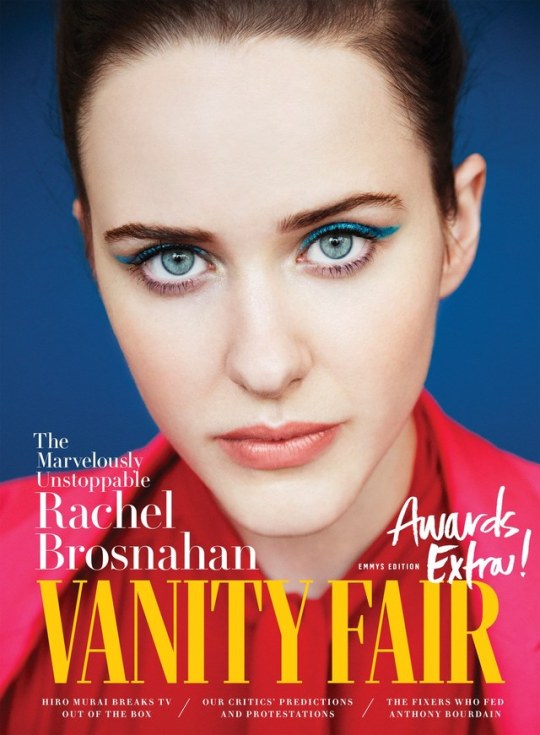
New Post has been published on https://shovelnews.com/the-funny-thing-about-rachel-brosnahan/
The Funny Thing About Rachel Brosnahan
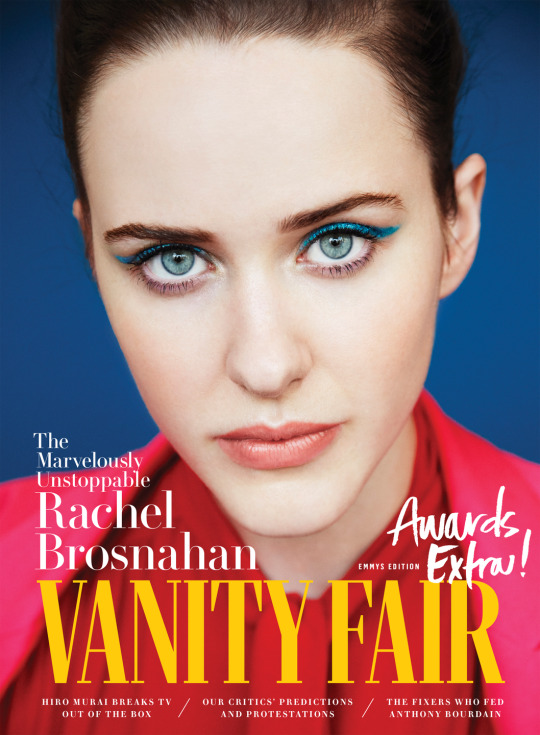
There’s a moment in the second season of The Marvelous Mrs. Maisel when the title character, a 1950s housewife turned up-and-coming stand-up comic, has to work a new type of room. Until now, she’s peddled her jokes mostly to pals at parties and small crowds at the cramped Gaslight Cafe—manageable groups, filled with friendly and slightly drunk faces. This time, though, she’s up against her biggest audience yet—an awareness that hit Rachel Brosnahan, who embodies Miriam “Midge” Maisel with an almost eerie precision, like a particularly sharp punch line. “As I got up onstage to perform that scene,” she says, “I realized that it was also bigger than anything that I was used to. And then I had the realization that it’s only going to get bigger and bigger—and more and more horrifying.”
Brosnahan is laughing when she tells this story, but she’s at least slightly serious about how scary it is for her to do comedy—even now. That’s because, as she’ll tell you herself, Brosnahan is emphatically not a comedian. She is, however, an actress—old-school, Method-trained, perhaps just the teensiest bit Type A. As a kid, she spent hours crafting a PowerPoint presentation in hopes of persuading her parents to let her get a dog. And as a 28-year-old, she channels that same energy into research. While preparing to play the title character in Amy Sherman-Palladino’s criminally charming comedy, Brosnahan didn’t just immerse herself in the work of Joan Rivers and Phyllis Diller and Jean Carroll and Carol Burnett. She also made a habit of attending open mikes, so-called “bringer” shows, where wannabe comics must deliver a certain number of spectators if they want to secure a spot onstage.
Brosnahan didn’t get that dog until right before she went to college, but the care she took for Mrs. Maisel paid off immediately. The series, which Amazon has already renewed through its third season, is delightful, a candy-colored screwball throwback that easily stands out among television’s dour biggest hits (Hulu’s The Handmaid’s Tale, HBO’s Westworld, FX’s dearly departed The Americans). Season One debuted last November 29; less than two weeks later, the series earned two Golden Globe nominations, for best comedy and for Brosnahan’s performance. It won both. At the Emmys, it will compete with 14 nominations, including outstanding comedy series and Brosnahan for outstanding lead actress in a comedy series.

Photograph by Erik Madigan Heck. For additional information, visit vf.com/credits.
All that, and Brosnahan still hasn’t performed stand-up outside the confines of a soundstage. “I think that would prevent me from ever being able to do this job,” she says. “I’d be so traumatized.” Instead, when she goes to comedy shows, she dedicates herself to being the world’s most supportive spectator. “Having even had a taste of what it’s like,” says Brosnahan, “I am the one laughing the loudest at everybody’s jokes in the back, because I want them to feel seen and heard and encouraged.”
That’s true even when the comedians are practiced and the environs are significantly slicker. Case in point: this breezy June night, when she’s taking a break from Mrs. Maisel’s corsets and tongue-tripping monologues to catch a show at Caveat, a surprisingly roomy basement venue on Manhattan’s Lower East Side. Once, Midge Maisel may have visited this neighborhood to hunt for Judaica and discounted leather goods; now it’s a yuppie paradise where Russ & Daughters will add a schmear of goat’s-milk cream cheese to your everything bagel for just $4. In her jeans, leather jacket, and subtly chic gold-framed glasses—a far cry from Midge’s nipped waists and full, rustling skirts—Brosnahan fits right in.
“I’m late to every party. But when I arrive, I arrive.”
When comedians Dave Mizzoni and Matt Rogers take the stage, Brosnahan is the first person in the crowd to jump to her feet. (She’s not just being nice; the three of them went to N.Y.U. together, and other friends are in the audience tonight as well.) She laughs gamely and generously as the evening unfolds, even on the occasions when Mizzoni’s and Rogers’s very targeted references—the name of this program is “The Gayme Show,” and its tagline is “Exactly what you think”—whiz right past her.
Spending 16 hours a day surrounded by Eisenhower-era culture doesn’t leave a person much time to study the complete works of Frankie Grande (Ariana’s brother) or prolific YouTuber and Taylor Swift bestie Todrick Hall—or even to keep up with old co-workers. At one point, an extended riff on the new Ryan Murphy drama, Pose, ends with a pointed crack about series regular Kate Mara. Until she hears the joke, Brosnahan has no idea that Mara—who, like her, was a regular on House of Cards—is appearing on Pose or that Pose has already premiered.
“I don’t have a TV,” she says with a sigh. “I am living in 1957.”
If she woke up one morning and decided to become an expert on the life and times of pop-star-adjacent Instagram stars, though, there’s no question Brosnahan would excel. She may not be as brash as Midge Maisel, who memorably finishes her first impromptu stand-up performance by exposing herself to a crowd of roaring Beatniks, but she’s nearly as self-assured, and every bit as capable. She’s subverted expectations on bigger stages than this one, after all.
“I’m late to every party,” Brosnahan says by way of apology to Mara. “But when I arrive, I arrive.”
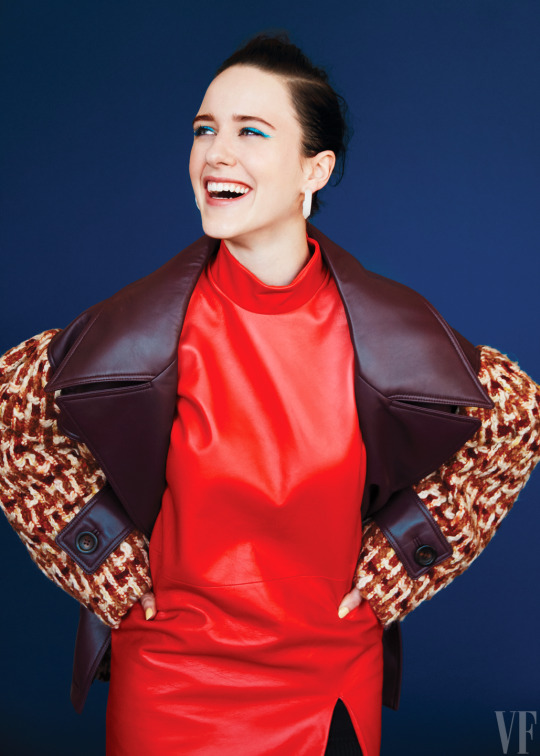
Before she read the Mrs. Maisel script, Brosnahan was planning to turn away from TV and toward theater and film. After, there was no question that Midge had to be hers.
Photograph by Erik Madigan Heck.
Objectively speaking, Brosnahan is being modest. She certainly didn’t arrive late to Hollywood: even before graduating from N.Y.U., in 2012, she was steadily booking bit parts on Gossip Girl, The Good Wife, and In Treatment. The roles were small but professional all the same, as essential to a budding acting career as a one a.m. open-mike slot is to a would-be Sarah Silverman.
“I’ve played Eating Disorder Girl, Girl, Call Girl—many types of girl,” she says, laughing. “That’s my type, all types of girl.” It’s a few hours before “The Gayme Show,” and Brosnahan is picking at a giant slice of carrot cake. Crowds of pastrami-seeking tourists have foiled our original plan to visit Katz’s Delicatessen; instead, we’ve settled into a squishy booth at the self-consciously retro Remedy Diner, a dead ringer for the vintage greasy spoons where Midge Maisel and her curmudgeonly manager, Susie (Alex Borstein), talk set lists over coffee and French fries.
Simple as these starter characters were, Brosnahan was savvy enough to see their value. Being last on the call sheet allowed her to listen, and observe, and take risks in a low-stakes environment before returning to the safe space of N.Y.U.’s Lee Strasberg Theatre & Film Institute—where she could “ask questions, and study, and try to get better. And then try it again.”
As her undergraduate career wound to a close, Brosnahan’s persistence led her to the ultimate “girl” role: a throwaway part in the first two episodes of a new political drama called House of Cards, that of a nameless prostitute. Her handful of lines included uninspiring utterances like “Excuse me” and “I mean, I’m kinky, but I don’t know if I’m the girl you’re looking for.”
Former show-runner Beau Willimon saw potential in Brosnahan’s raw, arresting performance and her immediate chemistry with actor Michael Kelly, who plays pathologically loyal future White House chief of staff Doug Stamper. Soon, he expanded Call Girl into a proper part, one that had an arc and a backstory and a name. One that would, a few years later, earn Brosnahan an Emmy nomination for outstanding guest actress in a drama. Kelly, who received his first Emmy nomination the same year, credits her work with elevating his own.
“I was sitting at the lunch table when Beau said, ‘I think we got to give you a name,’” Kelly recalls.
The one Willimon settled on, funny enough, was “Rachel,” which inspired some mild protest from Brosnahan: “I was like, What?! Why?! That’s so fucked up!”
“Rachel was not afraid to not fall apart. She was not afraid to be angry and to stay tough.”
It was, as was Rachel the character’s sorry existence, which began when she was caught beside a drunk-driving congressman and ended, two seasons later, in a shallow grave somewhere in the New Mexico desert. (No wonder Amy Sherman-Palladino likes to classify Brosnahan’s pre–Mrs. Maisel parts as “the girl that someone’s tied up and thrown in the back of a van.”)
But House of Cards also offered another education for Brosnahan—taught her the ins and outs of having a significant part on a prestige series at the dawn of the peak-TV era—and gave her an outlet to display the dark side of her sense of humor, if only among her peers when the cameras weren’t rolling. She and Kelly, her most frequent scene partner, grew close enough that even filming her final moments ended up being a blast; scroll back far enough on her Instagram, and you’ll find a sweet snapshot of the two of them contentedly spooning in the dusty hole that will eventually house Call Girl Rachel’s lifeless body.
Then there’s the matter of Fake Rachel’s dead-eyed head, a silicone model designed solely to be buried. “On my phone somewhere, there are some pictures of Michael and Beau and I making out with Rachel’s head,” Brosnahan says, sounding simultaneously sheepish and proud. “It’s really—it’s dark.”
Though she couldn’t have known it at the time, this was also decent practice for Mrs. Maisel—whose surface whimsy conceals more than a hint of bleakness. The series begins at the end of an era for Midge Maisel—née Weissman—who has spent the entirety of her young life meticulously ticking every box on a very strict, self-imposed rubric for feminine success. She’s a Bryn Mawr graduate with an alabaster complexion and a 25-inch waist; she’s given her husband, the feckless but amiable Joel (Michael Zegen), two children, a boy and a girl. She’s secured the community’s most prominent rabbi as a guest for her upcoming Yom Kippur break-fast. If there were any justice, Midge would spend the rest of her days tending to her picture-perfect family, indulgently accompanying Joel on his jaunts to Greenwich Village comedy clubs until the two of them got old and gray and ditched Manhattan for Longboat Key.
And then Joel delivers his sucker punch. “I just don’t want this life, this whole Upper West Side, classic six, best seats in temple,” he tells Midge, after an embarrassing attempt at delivering his own jokes at the Gaslight. Oh, and he’s also been sleeping with his secretary, a skinny shiksa named Penny Pann. Sherman-Palladino and her husband and collaborator, Dan Palladino, asked every actress they considered for Midge to read three scenes in their audition, including the big breakup.
“Most of the actresses, great actresses, came in and broke down—fell apart, as sometimes you will when somebody walks out on your life,” Sherman-Palladino says. “And Rachel was not afraid to not fall apart. She was not afraid to be angry and to stay tough. Because the thing about that scene is it was not there to show her vulnerability. That scene was there to show that pain brought out the comic’s voice.”

Brosnahan in The Marvelous Mrs. Maisel.
Photograph by Nicole Rivelli/©Amazon/Courtesy of Everett Collection.
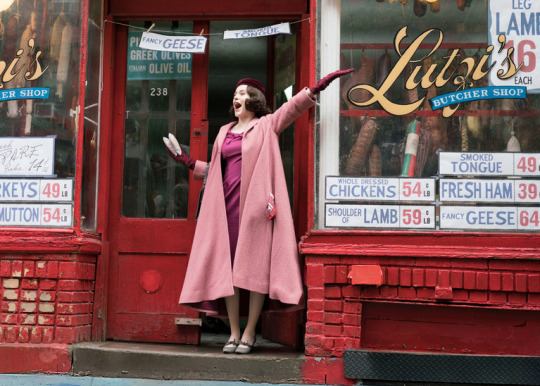
Photograph by Sarah Shatz/©Amazon/Courtesy of Everett Collection.
Sure enough, shortly after Joel up and leaves—packing his things in Midge’s suitcase, a final insult to injury—Midge ends up back at the Gaslight, sloshed on kosher wine, and wanders onto the stage. Before she knows it, she’s telling a roomful of strangers every sordid detail of her wrecked marriage, but sculpting the story so it sounds amusing rather than pathetic. She heckles one dim-witted audience member; she interrupts her stream of consciousness to talk real estate with another. In the midst of explaining why she made a perfect wife, she announces that there’s no truth to “all that shit they say about Jewish girls in the bedroom᠁ There are French whores standing around the Marais district saying, ‘Did you hear what Midge did to Joel’s balls the other night?’ ” She doesn’t stop until the police show up to book her for public indecency and performing without a cabaret license, and even they can’t keep her from landing one last zinger as she gestures toward her exposed breasts: “You think Bob Newhart’s got a set of these at home? Rickles, maybe!”
The performance is spontaneous and exhilarating and very, very funny, everything that Joel isn’t—and from the moment she grabs the mike, it’s clear that both Midge and the actress playing her are going to be big, bright shining stars.
Sherman-Palladino, still best known as the creator of the fast-talking, culturally omnivorous Gilmore Girls, has no shortage of colorful descriptors for her newest muse. In her eyes, Brosnahan is simply not human: “She’s a space alien, or she’s some sort of magical creature, or—I believe I’ve described her before as a Tolkien character. She’s just, she’s just kind of not of this earth.” Then again, Brosnahan’s appeal as a performer may be even more elemental. “She’s a very smart girl, and she understands things—which is 90 percent of the job.”
Born in Milwaukee and raised in the Chicago suburb of Highland Park, Brosnahan was a shy and serious kid who spent much of her time immersed in fantasy—Harry Potter, Roald Dahl, the kiddie adventure novels of Enid Blyton. During the summers, which she spent with her mother’s family in England, she’d work her way through an entire carry-on bag filled with books before replacing them all with new volumes for the trip home.
Her family, she says, tends more toward the athletic than the arty. (They obviously have a creative side as well; one of her father’s sisters was the designer Kate Spade, who died in June.) Brosnahan herself is a snowboarder as well as a former high-school wrestler—a fact that greatly amused Sherman-Palladino—but also fell for acting at an early age: “Something about the transformational process just felt magical, like a lot of those books.”
It’s easy to picture Brosnahan as a thoughtful little bookworm, a Hermione Granger type with a slightly morbid edge. Even now, she speaks with the careful deliberation of someone who values and understands the weight of words; her diction is flawless, with crisply pronounced consonants and no trace of a midwestern twang. “You work with her on set, and then off set you’ll kind of chat with her—and then you’re occasionally reminded that she’s 28 years old,” says Dan Palladino. Sherman-Palladino had a rude awakening along those lines when she told Brosnahan that she resembled a more smiley Tracy Flick: “She’s like, ‘Who’s that?’ I’m like, ‘Election?’ She goes, ‘What?’ And I’m 100. I’ve officially—I just turned 100.”
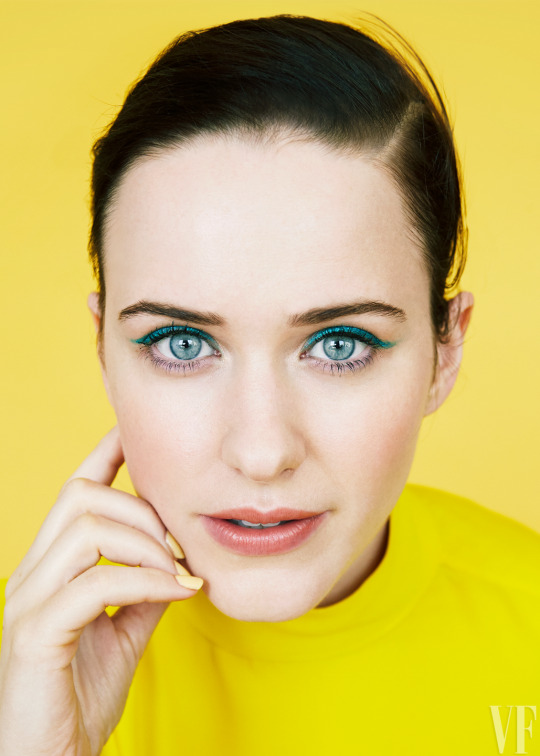
“I’ve played Eating Disorder Girl, Girl, Call Girl—many types of girl,” Brosnahan says of her early roles.
Photograph by Erik Madigan Heck.
So perhaps it comes as no surprise that Brosnahan wasn’t the most obvious choice to play Midge, a gregarious macher who speaks as quickly as, well, a woman dreamed up by Amy Sherman-Palladino. David Oyelowo, who played Othello to Brosnahan’s Desdemona in New York Theatre Workshop’s 2016 production, said in an e-mail that his co-star was worried about Mrs. Maisel initially because she didn’t consider herself to be funny. (“She is of course saying this while we’re taking silly selfies backstage just before I had to go onstage and murder her,” he added.) Brosnahan isn’t even Jewish—though Highland Park itself was Jewish enough, she says, that she’s been to “hundreds of Bar Mitzvahs, Bat Mitzvahs. I could maybe Bat Mitzvah you.”
Going into her Mrs. Maisel audition, though, Brosnahan had two things working in her favor. The first was that she’d recently finished playing a Jewish wife and mother with a well-to-do background and an enviable wardrobe on the little-watched but very good WGN America drama Manhattan, set within the desert compound where American scientists raced to design and build the first atomic bomb. Sam Shaw, that show’s creator, remembers that Brosnahan originally wanted to play the role of physicist Helen Prins. She worried that Abby Isaacs, the part she ended up getting, “would become Wife No. 3, like signing on for seven years of making crudités or something,” he says. But while Abby was not the show’s lead, she wasn’t a background character, either. The part gave Brosnahan an opportunity to imbue a woman of a bygone era with real depth, and to learn how to navigate restrictive, period-appropriate shapewear. (“I have learned so much about undergarments,” she says, deadpan. “And I truly don’t understand how anybody survived the 50s.”)
The second thing working in Brosnahan’s favor was that she wanted the part of Midge Maisel. Like, really wanted it, maybe more than anything since her parents got her that dog. Before she read the Mrs. Maisel script, Brosnahan was planning to turn away from TV and toward theater and film. After, there was no question that Midge had to be hers. She’s the kind of character, Brosnahan says, that “I often don’t see represented on television—somebody who is unapologetically confident, who has an innate sense of self-empowerment, who isn’t afraid to pat herself on the back for accomplishing goals. And who’s unapologetically ambitious.” While Midge is charming and lovable, she’s also superficial and flighty and a breathtakingly terrible mother who measures her baby’s forehead when she’s worried it’s getting too big; a flawed, recognizably human person, rather than a plucky proto-feminist who conforms precisely to 21st-century ideals.
That’s catnip for a determined young actress—and for a viewing audience beaten down by a news cycle of ever mounting tragedy and violence, not to mention a TV landscape dominated by dreariness. Even the comedies sharing Emmy space with Mrs. Maisel (Atlanta, Barry) are as likely to punch viewers in the gut as they are to make them laugh. “It’s a pretty shit time to be alive, and this show’s like a little ant moving a rubber-tree plant,” says Alex Borstein, who plays Susie, the wannabe agent who persuades Midge to pursue showbiz in a serious way. “You want to see these two people succeed. It’s a breath of fresh air.”
That was especially true in November, when the series debuted its full first season just as the #MeToo movement was reaching its zenith. It was a moment when every Twitter refresh seemed to expose a new, horrifying story of sexual misconduct. And then came Mrs. Maisel, a burst of cleansing light—colorful, fast-paced, sunny as an old-fashioned musical, but without anyone breaking into song. Ironically, it’s one of the only female-oriented shows that was green-lighted by former Amazon Studios head Roy Price before he resigned last October, after being accused of sexual harassment himself. (Price has not commented on the allegations.) Though there’s some darkness at its core, Mrs. Maisel is, above all, the jubilant story of a talented woman who works hard, triumphing over the odds and her mediocre loser of a husband. It is, as Brosnahan points out, partly a fantasy. But what a fantasy.
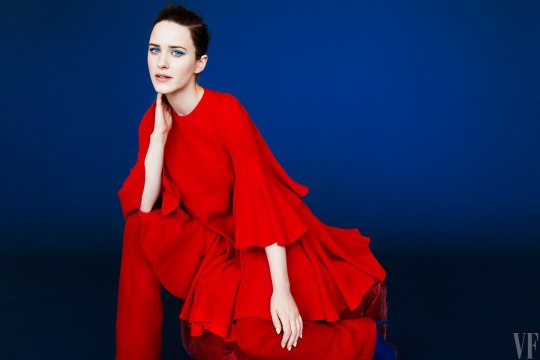
Though there’s some darkness at its core, Mrs. Maisel is, above all, the jubilant story of a talented woman who works hard, triumphing over the odds.
Photograph by Erik Madigan Heck.
It’s impossible to know to what extent Mrs. Maisel’s exultant reception has been affected by fortuitous timing. Brosnahan grows more thoughtful than usual when asked whether she believes it was, noting that the show’s story would be inspiring no matter the surrounding context. But possibly, she continues, Mrs. Maisel had an even greater impact because it debuted at a time when “we’re talking about women finding voices they didn’t know they had,” and—her words coming faster now, and more emphatically—“young people finding voices they didn’t know they had. This is a theme of the moment.”
Brosnahan has given a lot of thought to The Moment and, more specifically, to its momentum—how her industry, and all industries, can parlay this surge of righteous anger into lasting change. Though she’s never been a particularly active social-media user, she’s backed away from Twitter, she says, “because it just feels like we’re all shouting into a vacuum, and I’m trying to focus more on taking those active statements out of Twitter and into the real world.”
As her star rises, Brosnahan has also found herself being more careful about the things she posts online—for practical reasons, as well as the understandable desire to keep her private life private. “As somebody who’s always felt like a pretty open book, I find myself being very protective of whatever the elusive real me is,” she says. Famous performers sometimes become celebrities first and actors second, a fate that would have robbed Brosnahan of her prized ability to disappear fully into a role. (That said, she does have a very cute Instagram largely devoted to her dogs: a Shiba Inu named Winston and a pit bull named Nikki.)
Brosnahan doesn’t just hope to keep her on-screen options open. She’d love to do another play in the near-ish future, to produce, to direct. She wants to see and make more stories that focus on the nuances of female friendship, like one of her current favorite shows, Issa Rae’s Insecure. She’s already developing a pilot with a couple of friends, one that focuses on young people in politics. Brosnahan doesn’t plan to star in the show, but perhaps it’ll be a stepping-stone to the next phase in her career—just as those “girl” parts led to House of Cards led to Manhattan led to Mrs. Maisel.
As of now, Brosnahan’s success hasn’t had a hugely measurable impact on her day-to-day life. She can walk her dogs in broad daylight without being swarmed; she can laugh at a comedian’s joke about Oprah without anyone around her recognizing that she actually knows Oprah. (Or at least said hello to Oprah from the stage after winning a Golden Globe.) The biggest shift, she says, is that people finally know how to pronounce “Brosnahan.” But if she keeps climbing the way Mrs. Maisel’s heroine certainly will, all this could change as well.
Remember, she admires Midge for being unapologetically ambitious. And when asked if she’d describe herself the same way, Brosnahan doesn’t hesitate: “Absolutely. Yeah. Yeah!” Then, after a brief, perfectly timed beat, the TV comedian turns to the magazine reporter and nails another punch line: “How about you?”
Clothing by Valentino; boots by Andreas Kronthaler for Vivienne Westwood. Throughout: hair products by Bumble and Bumble; makeup by Chanel; nail enamel by Zoya.
Get Vanity Fair’s HWD Newsletter
Sign up for essential industry and award news from Hollywood.
Full ScreenPhotos: Marvelous Mrs. Maisel Creator Amy Sherman-Palladino and Her Many Hats
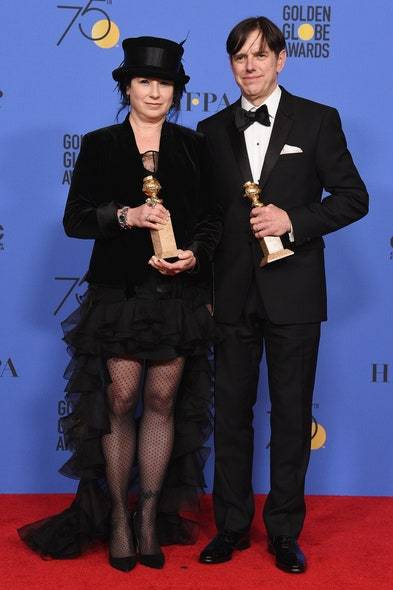
January 7, 2018
Hats off to the Sherman-Palladinos, husband-and-wife writing team.
Photo: By Kevork Djansezian/NBC/Getty Images.
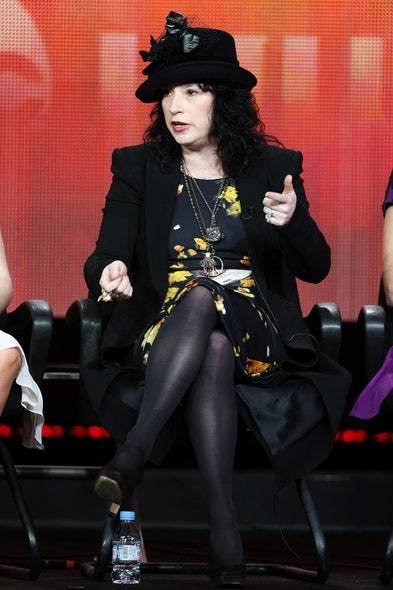
January 10, 2013
A top hat in her Bunheads days.
Photo: By Frederick M. Brown/Getty Images.
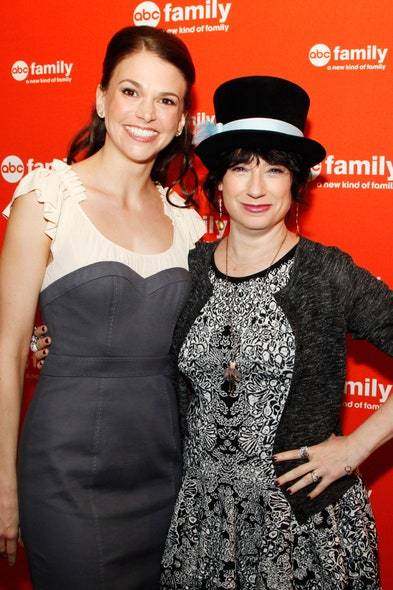
March 19, 2012
With Sutton Foster on the red carpet for Bunheads (hence the angelic blue bow, we assume).
Photo: By Heidi Gutman/Getty Images.
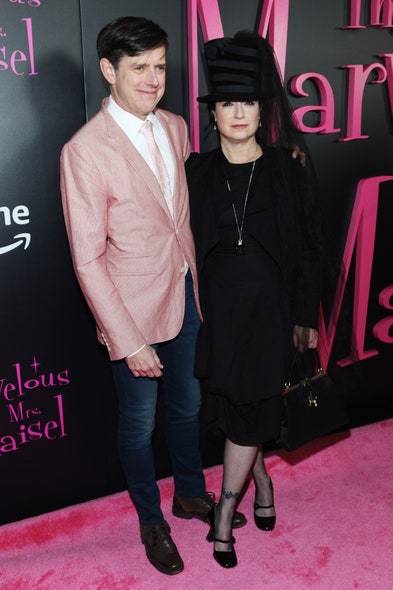
November 13, 2017
The higher the top hat, the closer to god.
Photo: By Steve Zak Photography/Getty Images.
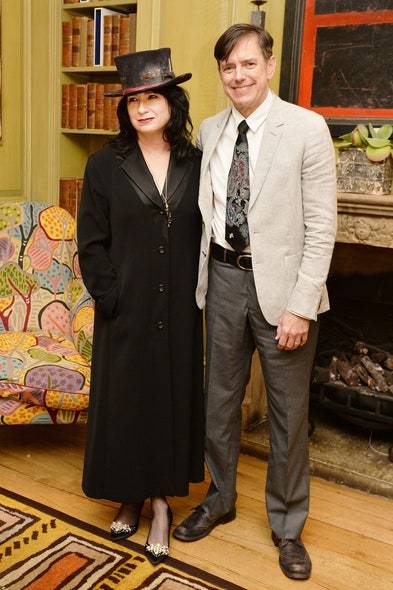
November 09, 2017
And still squarely in Dickens’s world.
Photo: By John Stillwell/PA Images/Getty Images.

April 21, 2003
A rare sun hat in her Gilmore Girls days.
Photo: By Mathew Imaging/Getty Images.

May 24, 2017
And an even more rare tan hat on the set of Marvelous Mrs. Maisel.
Photo: By Bobby Bank/Getty Images.
PreviousNext

January 7, 2018
Hats off to the Sherman-Palladinos, husband-and-wife writing team.
By Kevork Djansezian/NBC/Getty Images.

January 10, 2013
A top hat in her Bunheads days.
By Frederick M. Brown/Getty Images.
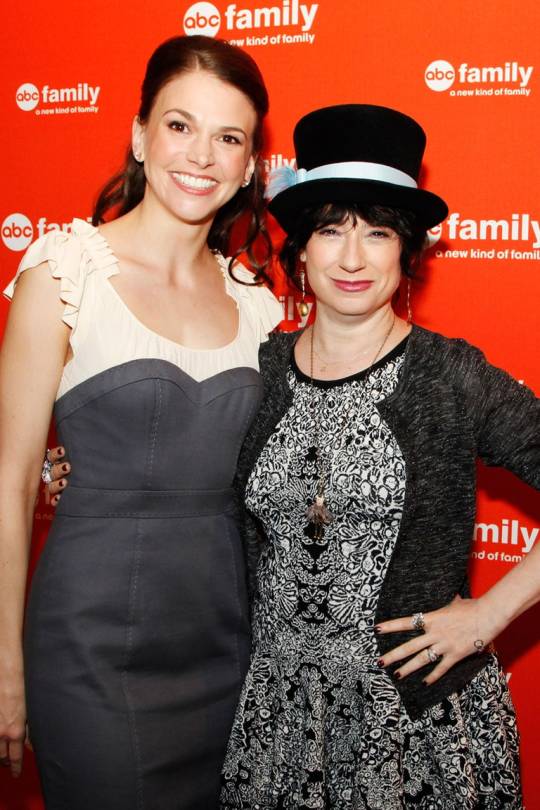
March 19, 2012
With Sutton Foster on the red carpet for Bunheads (hence the angelic blue bow, we assume).
By Heidi Gutman/Getty Images.
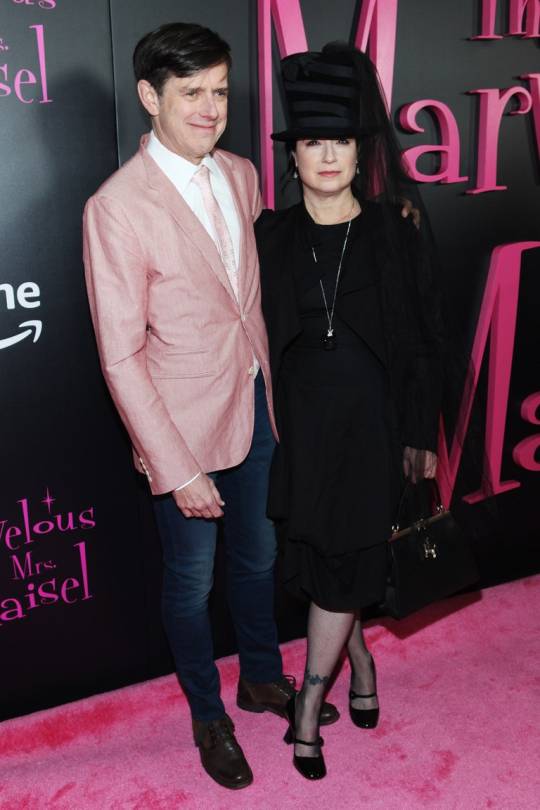
November 13, 2017
The higher the top hat, the closer to god.
By Steve Zak Photography/Getty Images.
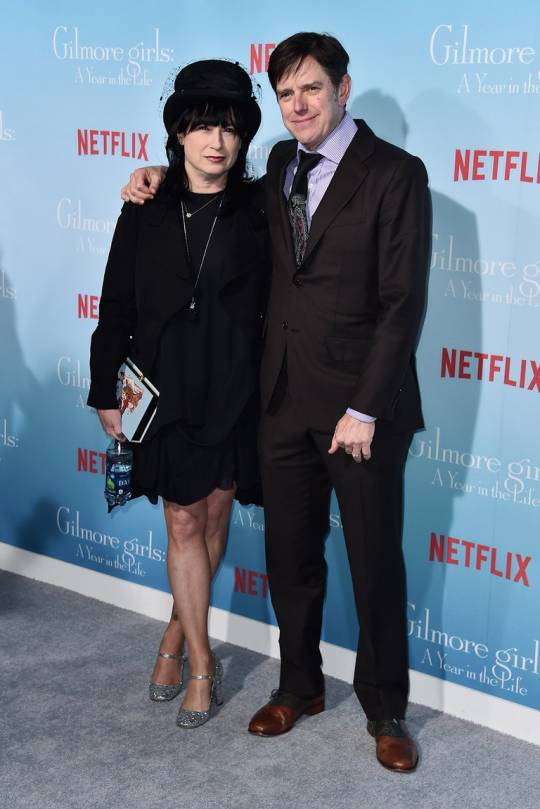
November 18, 2016
On the Netflix red carpet for Gilmore Girls: A Year in the Life. Recall the fantastical dance number in the last episode of that season, where top hats had an important role.
By Alberto E. Rodriguez/Getty Images.

October 29, 2016
Moving into Dickens territory here.
By Emma McIntyre/Getty Images.
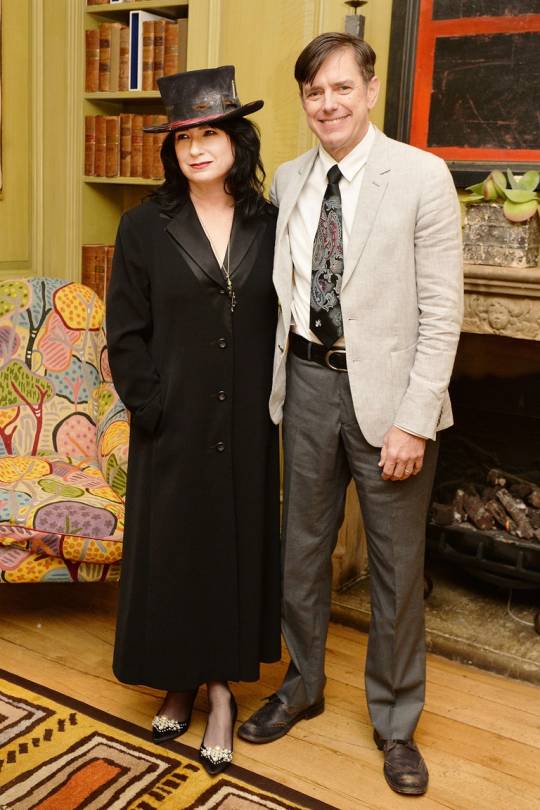
November 09, 2017
And still squarely in Dickens’s world.
By John Stillwell/PA Images/Getty Images.
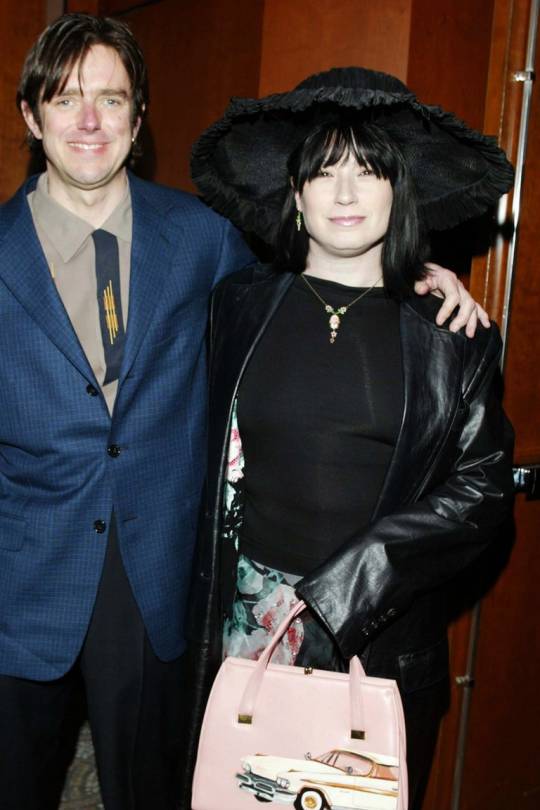
April 21, 2003
A rare sun hat in her Gilmore Girls days.
By Mathew Imaging/Getty Images.
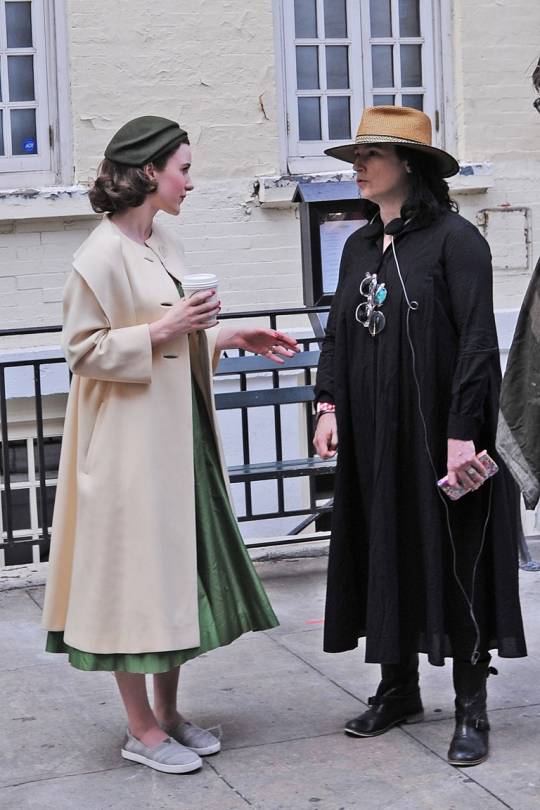
May 24, 2017
And an even more rare tan hat on the set of Marvelous Mrs. Maisel.
By Bobby Bank/Getty Images.
Source: https://www.vanityfair.com/hollywood/2018/08/rachel-brosnahan-cover-story
0 notes
Text
Best Tv Shows All Time
'The Daily Show' 1996-Present
The fa-Ke information display that became mo-Re credible as opposed to news that is real. Comedy Central started The Everyday Show in 1996, but it hit its stride when Jon Stewart took over in 1999. The Everyday Present got more politically abrasive as the the headlines got worse. Stewart had the rage of a man who'd signed on in the conclusion of the Bill Clinton years, only to finish up with an America much more scary and more ugly for, as well as the anger showed. "It's a comic box lined with unhappiness," he informed Rolling Stone in 2006. While the franchise struggles on without him, Samantha Bee and Daily alumni John Oliver keep that hard-hitting spirit alive on their shows.
youtube
'The Office (U.K.)' 2001 03
Ricky Gervais created one of TV's most agonizing comic tyrants in David Brent – a bitter, awkward, pompous ball of vanities terrorizing his workers at a London paper company. He fidgets, fondles his tie, cracks awful jokes, plays guitar ("Free Love Freeway"!), invisible to anyone except the longsuffering office drones who need to put up with him. This mockumentary raised the cringe level of sitcoms everywhere, spawning the surprisingly fantastic U.S. version (also on this checklist) while paving the way for the glories of Parks & Re-Creation and Peepshow.
youtube
'Sesame Street' 1969-Present
No kiddie present has ever been as fiercely beloved as this urban utopian fantasy, emerge a brownstone neighborhood populated by a multi racial cast of smiling adults, a gigantic yellow chicken, a grouch in a garbage can, and z/n-loving vampires, plus many talking letters and figures. It's great songs, but most important, Sesame h-AS soul, which can be why the air h-AS stayed sweet for 40 years – or as the Count would say, 4-5! 46! 47 years!
youtube
'The Sopranos' 1999 2007
The crime saga that slice the the history of TV kicking off a golden age when abruptly something seemed possible. With all The Sopranos, David Chase smashed all the rules about just how much you could get away with on the little screen. And he created an immortal American antihero in James Gandolfini's Nj Mob boss, Tony Soprano over a crew of gangsters who double as damaged husbands and dads, men seeking to live using their murderous secrets and dark memories. As the late, great Gandolfini told Rolling Stone in 2001, "I noticed David Chase say one time that it is about people who lie to themselves, as we all do. Lying to ourselves on a daily basis as well as the mess it creates." What an inspiring mess it is. This particular poll was run away with by the Sopranos as the planet was altered by it. Chase showed how much story telling ambition tv could be brought to by you, and it didn't take long for everybody else to to go up to his problem. The breakthroughs of the next few years – The Wire, Mad Guys, Breaking Bad – could not have happened without The Sopranos kicking the door down. But Chase had a tough time convincing any community to take on a story of a guilt- while his mom plots to destroy him, gangster who goes to therapy. "We'd no idea this show would appeal to folks," he told Rolling Stone. "The show really unexpectedly made this type of splash that it screwed all of US up." The Sopranos stored heading having a wild mix of humor and blood shed for the long bomb over six masterful seasons on HBO. When FBI agents tell Uncle Junior which mobsters they want him to finger, he says using a shrug, "I want to fuck Angie Dickinson – let us see who gets lucky first." The Sopranos is full of damaged characters who linger on in the long term parking of our national imagination – Edie Falco's Carmela, Dominic Chianese's Junior, Michael Imperioli's Christopher, Tony Sirico's Paulie Walnuts. E Street Band guitarist Steve Van Zandt became Tony's lieutenant Silvio – Chase spotted him on early Bruce Springsteen album addresses. (As Chase told Rolling Stone, "There was something about the E Street Band that looked the same as a crew.") It might not have been possible without Gandolfini's slow-burning intensity – he was the only actor who could deliver Tony's angst to life. But the writing, directing and acting went locations Television had never attained before. The Sopranos arguably hit its imaginative peak with all the well-known Pine Barrens episode, where Christopher and Paulie Walnuts wander away in the woods, realizing the gangster they tried to whack is still out there-in the darkness. They shiver in the cold. ("It is the the fuckin' Yukon out there!") They wait. And worry. The Sopranos never solved this mystery – for all we know, the Russian is nonetheless atlarge, however another key these guys can't shake off. In the streets, family loyalties flip, both on The Sopranos and a-T home. Beloved characters can get whacked at any given moment. It stored that perception of risk alive proper up to the ultimate seconds. And not quite a decade after it faded to black in a Jersey diner together with the juke-box playing "Do Not Cease Believin'," The Sopranos stays the standard all ambitious TV aspires to meet.
youtube
'Friday Night Lights' 200611
"Obvious eyes, total hearts, cannot drop" is the golden-rule in a dusty Texas town where everybody else lives and dies for the large college football team. But Friday Night Lights isn't truly about football s O much as family, perform, class, the bitter flavor of dashed goals, with Kyle Chandler as Coach Taylor, Connie Britton as wife Tami and Taylor Kitsch as Tim Riggins – the most most notable of the many vulnerable kids who go through the Panthers' locker room. Riggins' tale becomes particularly moving after his grid iron glory fades and genuine existence beats him down.
youtube
'Star Trek' 196669
The Starship Business took off using a five-year mission: "To explore unusual new worlds, to to locate new life and new civilizations," and it succeeded in making the most beloved of sci fi franchises, maybe not just inspiring numerous spin-offs but also codifying fan fiction as a creative art form. Gene Roddenberry's original sequence stays the the inspiration, with William Shatner's awesomely pulpy Capt. Kirk, Leonard Nimoy's logical Mr. Spock, Bones, Sulu, Uhura and Scotty. They make contact with strange and inexplicable lifeforms – Romulans, Gorns, Joan Collins. During its three years, Star Trek suffered from low ratings till NBC pulled the plug, but thanks to the most doggedly faithful of Television cults (re-member when "Trekkie" was an insult?), Roddenberry's vision lives long and prospers to this day.
youtube
'Mad Men' 200715
The American desire and how exactly to sell it – aside from Don Draper as well as the hustlers of Sterling Cooper, selling is the American dream. Mad Men became a sensation as soon as it appeared, partly due to the glam surface – a New York advert agency in the JFK period, all sex and money and liquor and cigarettes – but mostly as it was an audaciously adult drama which wasn't about cops or robbers (or medical practioners or lawyers), staking out new story-telling territory. Jon Hamm's womanizing ad man, Don, is a genius a-T shaping other people's goals and fantasies, but he can not e-Scape his own loneliness – he's a con-man who stole the identification of a lifeless Korean War officer and constructed a new life out of lies. "A good marketing individual is like an artist, channeling the lifestyle," creator Matthew Weiner told Rolling Stone. "They're supporting a mirror saying, 'This is the way you desire you were. That is the thing you're scared of.'" A room can be reduced by Don to tears although the content family memories he is attempting to sell are a fraud. There was nothing on TV as seductive as Mad Men before – and years later, there still isn't.
youtube
'Deadwood' 200406
Al Swearengen's moral philosophy: "you-can't cut the throat of every cock-sucker whose character it would improve." Spoken just like a Founding Father that is true. He is the villain of David Milch's epic Western set in the mud and slime of an 1870s South Dakota gold-mining c AMP. In the middle of it all (i.e., the saloon), Ian McShane's Al glowers, pours drinks, counts money and slices jugulars, in a frontier hell-hole total of prospectors, whores, drunks and dropped freaks looking for one last fatal battle to get in to (and often discovering it a T Al's place). It was like McCabe & Mrs. Miller with mo Re depressing sex scenes. The first two seasons are solid gold, the third, flimsier, but Deadwood is about how communities get built – and every one of the dirty work that requires.
youtube
Third Watch TV Show
'Cheers' 1982 93
You require a spot where everyone knows your title – even if it's just a dive bar in Boston full of regulars with no place else to go. Cheers started with a focus on the mismatched romantic banter between Ted Danson's washedup Red-Sox pitcher Sam and Shelley Long's up-tight book-worm Diane. ("Over my dead body!" "Hey, don't b-ring last evening in to this.") By attracting new blood like Kelsey Grammar, Kirstie Alley and Woody Harrelson, but it regularly renewed it self. Cheers was to the purpose where you could tune in to see which regulars would hang tonight.
youtube
0 notes